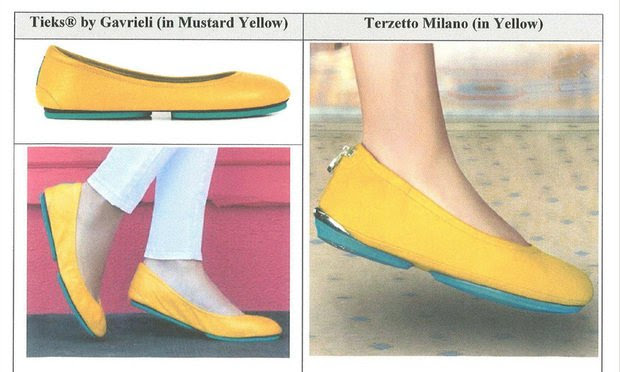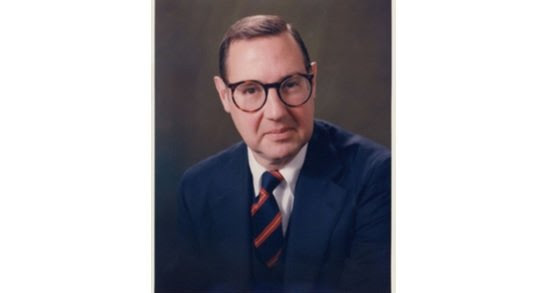Skilled in the Art: Copyright Tiff Over NBA Players' Tats + Paul Hastings Tries to Pump the Brakes on PTAB Rocket Dockets + Judge Puts Foot Down on Over-Litigation of Shoe Patent Case
They can take away the NBA, but they can't take away NBA video games—at least not because of unpaid tattoo licenses.
March 27, 2020 at 04:20 PM
8 minute read
Welcome to Skilled in the Art. I'm Law.com IP reporter Scott Graham. Here's what's cooking today:
• They can take away the NBA, but they can't take away NBA video games—at least not because of unpaid tattoo licenses.
• Paul Hastings asks the PTAB to be less deferential to district court rocket dockets.
• Judge Noreika finds shoe design case exceptional (and over-litigated).
• Gerald Mossinghoff was a man of many accomplishments.
As always, you can email me your feedback and follow me on Twitter.
 Los Angeles Lakers forward LeBron James, left, shoots as Los Angeles Clippers forward Marcus Morris Sr. defends. (AP Photo/Mark J. Terrill)
Los Angeles Lakers forward LeBron James, left, shoots as Los Angeles Clippers forward Marcus Morris Sr. defends. (AP Photo/Mark J. Terrill)
It's No Use Licensing Spilled Ink
If you're anything like me, you've been in major sports news withdrawal for the last few weeks. But I have a tiny fix for you from the place where LeBron James, intellectual property and even Harvey Weinstein intersect.
U.S. District Judge Laura Taylor Swain issued on Thursday what's believed to be the first written decision to address the application of copyright law to tattoos. Specifically, five tattoos sported by NBA players James, Kenyon Martin and Eric Bledsoe.
After creating the works, tattoo artists Justin Wright, Shawn Rome and Thomas Ray Cornett licensed the intellectual property to a company called Solid Oak Sketches. Solid Oak in turn demanded royalties from Take-Two Interactive Software, which depicts hundreds of players in its NBA 2K series of video games. The NBA and the players license their likenesses to Take Two.
Take-Two and its Kirkland & Ellis counsel obtained summary judgment on three grounds, which I'll list from least to the most interesting (at least for me).
First, the judge held that, despite the overall lifelike experience of NBA 2K, the five tattoos at issue are "indiscernible to the average viewer," observable only as "undefined dark shading" on the arms of three players out of 400. That amount of copying represents unactionable de minimis use, Swain ruled.
Second, any copying of the tattoos would be a transformative fair use. The original purpose of the tattoos is expression through body art, Swain reasoned, while Take-Two had the entirely different purpose of making its game characters recognizable.
(Side note: Take-Two's lead outside counsel on the case, Kirkland partner Dale Cendali, is also co-counsel to Oracle in its fair use battle with Google at the Supreme Court. Could this decision trip up Oracle? Probably not. Swain agreed with Take-Two that the tattoo images are "merely incidental" to the commercial value of the video games. And she found no evidence that a competing market for licensing tattoos is going to develop, "because the Tattoos are imprinted on the bodies of the Players" and they, not Solid Oak, control their publicity rights.)
Finally, Swain ruled that the tattoo artists necessarily granted the players an implied license to use the tattoos as part of their likenesses. The tattoo artists inked the designs onto the players' skin, "each knowing that the Players were likely to appear 'in public, on television, in commercials, or in other forms of media,'" Swain wrote.
Swain cited to The Weinstein Co. v. Smokewood Entertainment Group, a 2009 district court case in which Harvey Weinstein's film company tried unsuccessfully to claim an implied, non-exclusive license in a film after a distribution deal fell through. The judge in that case noted that that implied non-exclusive licenses should be found "only in 'narrow' circumstances where one party 'created a work at [the other's] request and handed it over, intending that [the other] copy and distribute it.'"
That's this case, Swain ruled.
Kirkland's team also featured partner Joshua Simmons.
Solid Oak was represented by Darren Heitner of Heitner Legal and Paul Haberman of the Law Offices of Paul S. Haberman.

Should PTAB Defer to the Rocket Dockets?
Paul Hastings is trying to take rocket dockets out of the equation at the Patent Trial and Appeal Board.
The PTAB ruled in 2018′s NHK Spring v. Intri-Plex Technologies that if the same invalidity arguments are at play in a district court case that's nearing trial, it may be more efficient for the board to exercise its discretion not to launch IPR proceedings. The board designated NHK Spring precedential last year.
Accused infringers have complained that this means that when patentees sue in plaintiff-friendly rocket dockets (cough ED-Tex cough WD-Tex), it can short-circuit their chance at PTAB review, even if they've petitioned within the statutory one-year time limit.
A Paul Hastings team led by partner Naveen Modi is now asking the PTAB's Precedential Opinion Panel, led by PTO Director Andrei Iancu, to overrule that decision.
Modi represents Sand Revolution II, which is trying to invalidate a competitor's patent on systems and methods for handling granular material used in fracking. A PTAB panel declined to institute proceedings in February, citing NHK Spring and noting that Continental's infringement case was scheduled for trial in July in the Western District of Texas.
Modi argues among other things that trial schedules are inherently unpredictable. Since the PTAB issued its decision, the district court trial has been pushed back to September. The same thing happened in NHK Spring. "Thus, denying institution based on the speculative timing of the district court trial is empirically unsound," Modi writes.
Sand Revolution has one thing going for it. PTAB APJ Carl DeFranco dissented from the panel decision denying institution. He noted among other things that even with a July trial date, hashing out damages and post-trial motions could easily push final judgment past next February, when the PTAB would have been expected to rule.
 Shoe comparison photos from civil action complaint Gavrieli Brands v. Soto Massini
Shoe comparison photos from civil action complaint Gavrieli Brands v. Soto Massini
Shoe Defendants Stepped Out of Line
It sounds as if U.S. District Judge Maryellen Noreika is ready to move on from a hard-fought design patent and trademark dispute over Tieks ballet flats.
Gavrieli Brands won a $2.9 million judgment last year after persuading a jury that a Kickstarter-funded company was infringing the distinctive design of its shoes, as my ALM colleague Jenna Greene documented here.
Noreika made that verdict hurt a little more on Tuesday, ordering defendant Soto Massini (USA) to destroy any remaining inventory of accused shoes and enjoining it from selling any shoes that are "not colorably different." She also held Soto Massini CEO Thomas Pichler personally liable for damages, and found the case exceptional under the Lanham Act.
Noreika noted that she'd already declined to dismiss Pichler from the case, and rejected defense arguments that she had done so "without explanation."
"At the conclusion of the February 11, 2019 argument, the Court read its ruling from the bench, along with the accompanying reasoning, all of which appears on the record in this case," she wrote in a 29-page order.
In finding the case exceptional, Noreika rapped Soto Massini for "discovery deficiencies, questionable assertions made by Mr. Pichler, prejudicially late disclosures, surprise requests at trial and improper arguments at trial."
Soto Massini was represented by Stamoulis & Weinblatt and SML Avvocati. In fairness to them, Noreika stated that she "could not determine whether the unreasonable manner in which this case was litigated is attributable to Defendants or to Defendants' counsel."
All of that was good news for Gavrieli and a Morgan, Lewis & Bockius team led by partners Mike Lyons and John Gorman, of counsel Ahren Hsu Hoffman, and associates Ehsun Forghany, Marinna Radloff, and Amy Dudash.
But Noreika threw a little shade their way too.
"Plaintiff over-litigated this case," she wrote. "Although Plaintiff is certainly entitled to enforce its intellectual property rights and pursue litigation, the Court believes some of the fees incurred by Plaintiff could have been avoided."
That, combined with Pichler's likely inability to satisfy the judgment, meant that Noreika will award fees "only for the most egregious actions by Defendants," such as their mid-trial request for a Markman hearing.
She gave Gavrieli two weeks to submit an accounting. That should not include any fees for briefing the fee motion, she added, "at least in part because a fee amount or estimate should already have been provided."

Belated RIP, Gerald Mossinghoff
I've been remiss about the passing of Oblon senior counsel Gerald Mossinghoff last week at age 84.
Mossinghoff headed up the PTO during the first half of the Reagan administration, advising the president on the creation of the Federal Circuit. He later served as head of the Pharmaceutical Research and Manufacturers Association, and put in eight years on the PTO's Patent Public Advisory Committee.
PTO Director Andrei Iancu described Mossinghoff as "a true legend in the American intellectual property community." His accomplishments included leading the PTO toward automation; integrating computers into agency operations; and working with Congress to make the office more self-sufficient through patent and trademark fees, Iancu said in a public statement.
Maier & Maier partner Stephen Kunin, who worked for Mossinghoff at the PTO and alongside him at Oblon, has a rundown of his accomplishments at IP Watchog.
That's all from Skilled in the Art this week. I'll see you all again on Tuesday.
This content has been archived. It is available through our partners, LexisNexis® and Bloomberg Law.
To view this content, please continue to their sites.
Not a Lexis Subscriber?
Subscribe Now
Not a Bloomberg Law Subscriber?
Subscribe Now
NOT FOR REPRINT
© 2025 ALM Global, LLC, All Rights Reserved. Request academic re-use from www.copyright.com. All other uses, submit a request to [email protected]. For more information visit Asset & Logo Licensing.
You Might Like
View All
Skilled in the Art With Scott Graham: I'm So Glad We Had This Time Together

Design Patent Appeal Splinters Federal Circuit Panel + Susman Scores $163M Jury Verdict + Finnegan Protects Under Armour's House
Law Firms Mentioned
Trending Stories
- 1Pistachio Giant Wonderful Files Trademark Suit Against Canadian Maker of Wonderspread
- 2New York State Authorizes Stand-Alone Business Interruption Insurance Policies
- 3Buyer Beware: Continuity of Coverage in Legal Malpractice Insurance
- 4‘Listen, Listen, Listen’: Some Practice Tips From Judges in the Oakland Federal Courthouse
- 5BCLP Joins Saudi Legal Market with Plans to Open Two Offices
Who Got The Work
J. Brugh Lower of Gibbons has entered an appearance for industrial equipment supplier Devco Corporation in a pending trademark infringement lawsuit. The suit, accusing the defendant of selling knock-off Graco products, was filed Dec. 18 in New Jersey District Court by Rivkin Radler on behalf of Graco Inc. and Graco Minnesota. The case, assigned to U.S. District Judge Zahid N. Quraishi, is 3:24-cv-11294, Graco Inc. et al v. Devco Corporation.
Who Got The Work
Rebecca Maller-Stein and Kent A. Yalowitz of Arnold & Porter Kaye Scholer have entered their appearances for Hanaco Venture Capital and its executives, Lior Prosor and David Frankel, in a pending securities lawsuit. The action, filed on Dec. 24 in New York Southern District Court by Zell, Aron & Co. on behalf of Goldeneye Advisors, accuses the defendants of negligently and fraudulently managing the plaintiff's $1 million investment. The case, assigned to U.S. District Judge Vernon S. Broderick, is 1:24-cv-09918, Goldeneye Advisors, LLC v. Hanaco Venture Capital, Ltd. et al.
Who Got The Work
Attorneys from A&O Shearman has stepped in as defense counsel for Toronto-Dominion Bank and other defendants in a pending securities class action. The suit, filed Dec. 11 in New York Southern District Court by Bleichmar Fonti & Auld, accuses the defendants of concealing the bank's 'pervasive' deficiencies in regards to its compliance with the Bank Secrecy Act and the quality of its anti-money laundering controls. The case, assigned to U.S. District Judge Arun Subramanian, is 1:24-cv-09445, Gonzalez v. The Toronto-Dominion Bank et al.
Who Got The Work
Crown Castle International, a Pennsylvania company providing shared communications infrastructure, has turned to Luke D. Wolf of Gordon Rees Scully Mansukhani to fend off a pending breach-of-contract lawsuit. The court action, filed Nov. 25 in Michigan Eastern District Court by Hooper Hathaway PC on behalf of The Town Residences LLC, accuses Crown Castle of failing to transfer approximately $30,000 in utility payments from T-Mobile in breach of a roof-top lease and assignment agreement. The case, assigned to U.S. District Judge Susan K. Declercq, is 2:24-cv-13131, The Town Residences LLC v. T-Mobile US, Inc. et al.
Who Got The Work
Wilfred P. Coronato and Daniel M. Schwartz of McCarter & English have stepped in as defense counsel to Electrolux Home Products Inc. in a pending product liability lawsuit. The court action, filed Nov. 26 in New York Eastern District Court by Poulos Lopiccolo PC and Nagel Rice LLP on behalf of David Stern, alleges that the defendant's refrigerators’ drawers and shelving repeatedly break and fall apart within months after purchase. The case, assigned to U.S. District Judge Joan M. Azrack, is 2:24-cv-08204, Stern v. Electrolux Home Products, Inc.
Featured Firms
Law Offices of Gary Martin Hays & Associates, P.C.
(470) 294-1674
Law Offices of Mark E. Salomone
(857) 444-6468
Smith & Hassler
(713) 739-1250










